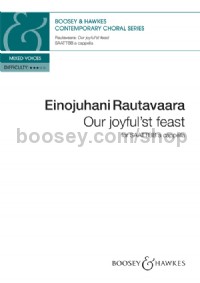Our joyful'st feast (SATB with divisi a cappella) - Digital Sheet Music
Our joyful'st feast (SATB with divisi a cappella) - Digital Sheet Music
* Estimated price converted from UK retail price
If purchasing for performance, the quantity must be equal to the number of performers for mixed choir (SAATTBB) a cappella
for mixed choir (SAATTBB) a cappella
Text: English (Shakespeare, George Wither)
Duration: 4'30''
Difficulty: 3/5
Use: Christmas
This Christmas carol, commissioned by the Finnish broadcasting company (YLE) for Euroradio Christmas Music Day concert in Helsinki and first performed by Helsinki Chamber Choir, conducted by Nils Schweckendiek, is based on three texts, two by William Shakespeare and one by George Wither. The largely homophonic textures combine with Rautavaara’s characteristically rich and often chromatic harmonies to form a very effective and satisfying work, a bit different from the usual Christmas offering.
Einojuhani Rautavaara
Einojuhani Rautavaara is the leading Finnish composer of his generation. He studied with Merikanto at the Helsinki Academy (1948–52), with Persichetti at the Juilliard School in New York (1955–56), and with Sessions and Copland at Tanglewood (1955). He first came to international attention in 1955 when the neo-classical A Requiem in Our Time for brass and percussion won the Thor Johnson Composer’s Competition in Cincinnati. He studied serialism and soon integrated twelve note techniques, without displacing his essential Romanticism. In the late 1960s Rautavaara distanced himself from serialism and his mystical character came more to the fore in music of rich colour and sweeping melodic profile, at once accessible and evocative. Widely performed choral works include Vigilia (1971-72, rev.1996), True & False Unicorn (1971, revised 2001–02) and Katedralen (The Cathedral, 1983). His Suite de Lorca (1973) is internationally one of the most popular Finnish choral works of all time. Rautavaara’s music has been recorded on the Ondine, Finlandia, Hyperion and Naxos labels and DVDs have been released of his operas The Gift of the Magi, Alexis Kivi and Rasputin.
 |



